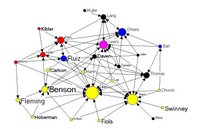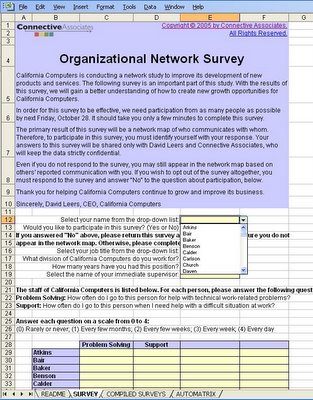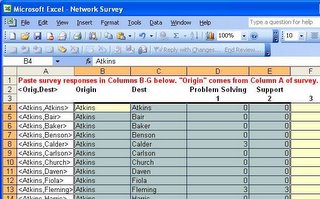"Find out just what any people will quietly submit to and you have the exact measure of the injustice and wrong which will be imposed on them."This work is licensed under a Creative Commons Attribution-ShareAlike 3.0 License and is copyrighted (c) 2009 by Connective Associates LLC except where otherwise noted.
Monday, June 29, 2009
Tweet of submission: @behoppe
Claire Reinelt has won me over. My first tweet is this quote from Frederick Douglass:
Thursday, June 25, 2009
Following the world's greatest RSS feed
Thank you Paul Toms for sharing your Twitter experiences and other reminisces in response to my last post. I like the Will Leitch article ("Why Twitter is more fun the less you use it") and your quote from it: "Twitter is the world's greatest RSS feed."
Like Paul and Will, I am a fan of RSS. (For those unfamiliar with RSS, it is New Media's version of the AP News Wire; see "RSS in plain English" by Common Craft.)
Much like Will, I find RSS (e.g., Twitter) to be more fun the less I use it. But my idea of "using" is different than Will's. I consider reading to be "using" whereas Will considers reading to be "not using."
A couple examples of how I use and follow RSS feeds without reading:
Like Paul and Will, I am a fan of RSS. (For those unfamiliar with RSS, it is New Media's version of the AP News Wire; see "RSS in plain English" by Common Craft.)
Much like Will, I find RSS (e.g., Twitter) to be more fun the less I use it. But my idea of "using" is different than Will's. I consider reading to be "using" whereas Will considers reading to be "not using."
A couple examples of how I use and follow RSS feeds without reading:
- Over the years I have subscribed to hundreds of blogs and other RSS feeds using NewsGator. Rather than read them, I simply let NewsGator dump them into my Outlook mailbox. Once the content is in my mailbox, my cheap mongo-hard-drive and my free desktop search software (Copernic) keep all that content ready for me. For example, now that I am curious to read about Twitter, I can search my hard drive for "Twitter" and see that Nova Spivak blogged a few months ago that "In the world of Twitter things happen in real-time, not Internet-time. It's even faster than the world of the 1990's and the early 2000's." He goes on to chronicle the acceleration of our lives, concluding: "Twitter is simply faster.... Twitter may overcome the asynchronous nature of the Web. Even search may go 'real-time.'" Having waited 4 months for the moment when I actually care to read Nova's post, I will wait a while longer before I respond to his hope that Twitter will help us "overcome the asynchronous nature of the Web" and make "search go 'real-time'"--two statements that beg for rebuttal.
- Another one of my favorite uses of RSS is the right sidebar of the Leadership Networks site, "Recently Noted Links." The links in this sidebar come from an RSS feed that provides Leadership Networks with a non-stop news-ticker of content that is relevant and useful to the audience of the site. Furthermore, this one RSS feed represents the synthesis of hundreds of RSS feeds. You can glimpse under the hood here. It's similar to the previous example, except that the content scrolls down the Leadership Networks sidebar instead of getting archived to my hard drive. I guess the content of that sidebar is my version of what Nova Spivak calls "real-time search." Because I see it that way, the content is presented to embody (not to overcome) the asynchronous nature of the Web: It's available but not interrupting, there when you want it.
Tuesday, June 23, 2009
Twitter: timing is everything...?
The majority of my clients and colleagues are using it, but I have not uttered the word until now: TWITTER. I was convinced to break my silence when I saw Time magazine: "How Twitter Will Change the Way We Live."
Here is my version of Time's story: Twitter does to texting what blogging did to email.
So let's get to the root of the matter: Texting. John Cassidy says it better than I can in the October 2008 New Yorker, "Thumbspeak: Is Texting Here to Stay?" Summary of Cassidy: We may be helplessly addicted to crackberries etc, but we are not addicted to typing words with numeric keypads. As soon as we all have QWERTY in our palms, we will then do away with the 140-character barrier and, with that, all the quirks that make txt msgs distinct from emails will quickly die a natural death.
If texting becomes indistinguishable from emailing (grant me that hypothetical just for a moment) how then will Tweeting differ from blogging? I am curious.
[The editor pauses... almost publishes the post... then takes a phone call from a colleague with more Twitter stories. A change of heart occurs.]
No, wait, I have glossed over something fundamental: Timing. Words have rhythm. Even if my version of the Twitter story is technically true (which I think it is), it misses the whole timing thing. That is a big deal, experientially if not technically.
Comments, anyone?
This work is licensed under a Creative Commons Attribution-ShareAlike 3.0 License and is copyrighted (c) 2009 by Connective Associates LLC except where otherwise noted.
Here is my version of Time's story: Twitter does to texting what blogging did to email.
So let's get to the root of the matter: Texting. John Cassidy says it better than I can in the October 2008 New Yorker, "Thumbspeak: Is Texting Here to Stay?" Summary of Cassidy: We may be helplessly addicted to crackberries etc, but we are not addicted to typing words with numeric keypads. As soon as we all have QWERTY in our palms, we will then do away with the 140-character barrier and, with that, all the quirks that make txt msgs distinct from emails will quickly die a natural death.
If texting becomes indistinguishable from emailing (grant me that hypothetical just for a moment) how then will Tweeting differ from blogging? I am curious.
[The editor pauses... almost publishes the post... then takes a phone call from a colleague with more Twitter stories. A change of heart occurs.]
No, wait, I have glossed over something fundamental: Timing. Words have rhythm. Even if my version of the Twitter story is technically true (which I think it is), it misses the whole timing thing. That is a big deal, experientially if not technically.
Comments, anyone?
This work is licensed under a Creative Commons Attribution-ShareAlike 3.0 License and is copyrighted (c) 2009 by Connective Associates LLC except where otherwise noted.
Monday, June 22, 2009
Beginner's mind and collective intelligence
 It's five years to the day since the first post on Connectedness.
It's five years to the day since the first post on Connectedness.An unspoken theme of those five years deserves recognition today: Beginner's Mind. I heard the phrase last September, when Fred Small preached his very first sermon as the new senior minister at my church.
Without Fred's flair for story-telling, Wikipedia still does a good job of explaining beginner's mind:
"Beginner's mind ... refers to having an attitude of openness, eagerness, and lack of preconceptions when studying a subject, even when studying at an advanced level, just as a beginner in that subject would. The term is especially used in the study of Zen Buddhism and Japanese martial arts.My fascination with beginner's mind often puts me in a bind: In my consulting and my teaching, I am usually invited to take the role of expert, the perspective that will reduce the confusion of many possibilities to the simplicity of the few and the best. Rarely am I invited to help experts take off the focused blinders of their hard-won experience.
"The phrase was also used as the title of Zen teacher Shunryu Suzuki's book: Zen Mind, Beginner's Mind, which reflects a saying of his regarding the way to approach Zen practice: In the beginner's mind there are many possibilities, in the expert's mind there are few."
Beginner's mind is easily left behind and forgotten. For example, consider that exemplar of communal beginner's knowledge: Wikipedia. The scope and accuracy of this site are deservedly celebrated: Rob Laubacher, Executive Director of the MIT Center for Collective Intelligence, notes that Harvard medical school students prepare for exams using Wikipedia. But where do beginners turn for an introduction to anatomy, once Harvard medical students have claimed Wikipedia as their study guide? I posed that question to Rob. He said it was the first time he had heard the notion that Wikipedia was evolving into a collection of specialized expert-driven beginner-unfriendly articles. We wondered if my experience of Wikipedia being advanced and not at all beginner-friendly was related to the topic my students most want to learn: Web technology.
To a point, perhaps. As a case study of how Wikipedia takes a simple non-Web idea and moves it beyond the grasp of beginners, consider the notion of probability as introduced by Wikipedia and Encyclopedia Britannica. Within its first few paragraphs, before citing a single concrete example of probability (e.g., flipping a coin, rolling dice), Wikipedia asserts that
 which is easy for them to say. And I mean that truly. Once you have mastered such notation, explaining probability with a language as imprecise as English is really hard. Yet English is the language spoken most often by American students. So where are they to turn? Read Britannica and see for yourself.
which is easy for them to say. And I mean that truly. Once you have mastered such notation, explaining probability with a language as imprecise as English is really hard. Yet English is the language spoken most often by American students. So where are they to turn? Read Britannica and see for yourself.When Wikipedia introduces probability as
 is that what we mean by "collective intelligence," "working wikily," or "wikinomics"? Probably not. But you have to admit it makes sense for Wikipedia to explain probability to us in that way. Why should privileged experts with mastery of a valuable language such as probability theory make it easy for ignorant beginners to join them? The simplest answer is, "Because Encyclopedia Britannica pays them to." In conversations with Rob and others, I have heard of other sensible and even uplifting answers to this question. And so I hope that ignorant and expert alike may be blessed with Beginner's Mind.
is that what we mean by "collective intelligence," "working wikily," or "wikinomics"? Probably not. But you have to admit it makes sense for Wikipedia to explain probability to us in that way. Why should privileged experts with mastery of a valuable language such as probability theory make it easy for ignorant beginners to join them? The simplest answer is, "Because Encyclopedia Britannica pays them to." In conversations with Rob and others, I have heard of other sensible and even uplifting answers to this question. And so I hope that ignorant and expert alike may be blessed with Beginner's Mind.PS: See James Surowiecki for a good argument that high-quality information requires high-quality compensation.
PPS: My last sustained post along these lines was this one, in reference to John Ziman's 1968 monograph Public Knowledge--An Essay Concerning the Social Dimension of Science, specifically in the chapter "Community and Communications."
This work is licensed under a Creative Commons Attribution-ShareAlike 3.0 License and is copyrighted (c) 2009 by Connective Associates LLC except where otherwise noted.
Friday, June 05, 2009
Organizational network analysis utility: Unleashed
Back in November 2005 I posted an organizational network analysis utility — a spreadsheet to help process network survey data and load it into network analysis software like UCINET (which is one of my faves, just behind NetDraw and Visone).
Since then, the spreadsheet has been available via email. But I confess that I have more than occasionally fallen behind in emailing copies to those who have requested. Sorry about that.
Now the spreadsheet is available by direct download from the Leadership Networks site here. No more waiting for emails from me.
Not coincidentally, I have been reading posts by Claire Reinelt about unleashing leadership networks — as opposed to sustaining them. Summarizing Ed O'Malley who directs the Kansas Leadership Center, Claire lists 7 practices for unleashing. The 3rd is "let go of the control."
In other words, it's time for me to stop being a bottleneck! Below is more information about the spreadsheet utility, copied from the original Nov 2005 post:
Organizational network analysis provides intuitively compelling pictures of how work really happens, giving us a handle on slippery intangibles that drive the future success of an enterprise.

Although this kind of intuitive analytical power has very wide appeal, its usefulness is limited right now by the unwieldy software tools currently available.
Deep down, making good simple network pictures is inherently complicated, but using network visualization software doesn't have to be. Progress is being made every day. See the newly updated list of SNA software in the right sidebar for some great examples. (And please let me know if I'm missing something.)
Even with the simplest of these tools, my non-technical clients often get hung up right away with the basic task of getting the data in. We power-users can easily forget how hard it was to build our first network, until we see someone else learning for the first time.
Here's an Excel spreadsheet utility my clients and I find helpful. I now make it freely available, in the hopes that more people will enjoy the benefits of seeing the big picture of the network perspective.
The spreadsheet includes three worksheets. One worksheet is the actual survey, which can be modified to suit the specific project. It automatically incorporates the names of the survey population into a drop-down list.
 After distributing the survey via email, collected responses can be pasted in any order into a "compiled survey" worksheet:
After distributing the survey via email, collected responses can be pasted in any order into a "compiled survey" worksheet:

Then an "automatrix" worksheet converts th e compiled results into square matrices that can easily be pasted into available network analysis tools. The matrix calculator makes it easy to manage who opts in or out of the survey, and it provides access to multiple relationships.
e compiled results into square matrices that can easily be pasted into available network analysis tools. The matrix calculator makes it easy to manage who opts in or out of the survey, and it provides access to multiple relationships.
If you'd like a copy of the spreadsheet, which includes a copy of a great California Computer case study (permission granted by David Krackhardt), you can download it here.
This work is licensed under a Creative Commons Attribution-ShareAlike 3.0 License and is copyrighted (c) 2009 by Connective Associates LLC except where otherwise noted.
Since then, the spreadsheet has been available via email. But I confess that I have more than occasionally fallen behind in emailing copies to those who have requested. Sorry about that.
Now the spreadsheet is available by direct download from the Leadership Networks site here. No more waiting for emails from me.
Not coincidentally, I have been reading posts by Claire Reinelt about unleashing leadership networks — as opposed to sustaining them. Summarizing Ed O'Malley who directs the Kansas Leadership Center, Claire lists 7 practices for unleashing. The 3rd is "let go of the control."
In other words, it's time for me to stop being a bottleneck! Below is more information about the spreadsheet utility, copied from the original Nov 2005 post:
Organizational network analysis provides intuitively compelling pictures of how work really happens, giving us a handle on slippery intangibles that drive the future success of an enterprise.

Although this kind of intuitive analytical power has very wide appeal, its usefulness is limited right now by the unwieldy software tools currently available.
Deep down, making good simple network pictures is inherently complicated, but using network visualization software doesn't have to be. Progress is being made every day. See the newly updated list of SNA software in the right sidebar for some great examples. (And please let me know if I'm missing something.)
Even with the simplest of these tools, my non-technical clients often get hung up right away with the basic task of getting the data in. We power-users can easily forget how hard it was to build our first network, until we see someone else learning for the first time.
Here's an Excel spreadsheet utility my clients and I find helpful. I now make it freely available, in the hopes that more people will enjoy the benefits of seeing the big picture of the network perspective.
The spreadsheet includes three worksheets. One worksheet is the actual survey, which can be modified to suit the specific project. It automatically incorporates the names of the survey population into a drop-down list.
 After distributing the survey via email, collected responses can be pasted in any order into a "compiled survey" worksheet:
After distributing the survey via email, collected responses can be pasted in any order into a "compiled survey" worksheet:
Then an "automatrix" worksheet converts th
 e compiled results into square matrices that can easily be pasted into available network analysis tools. The matrix calculator makes it easy to manage who opts in or out of the survey, and it provides access to multiple relationships.
e compiled results into square matrices that can easily be pasted into available network analysis tools. The matrix calculator makes it easy to manage who opts in or out of the survey, and it provides access to multiple relationships.If you'd like a copy of the spreadsheet, which includes a copy of a great California Computer case study (permission granted by David Krackhardt), you can download it here.
This work is licensed under a Creative Commons Attribution-ShareAlike 3.0 License and is copyrighted (c) 2009 by Connective Associates LLC except where otherwise noted.
Subscribe to:
Posts (Atom)

